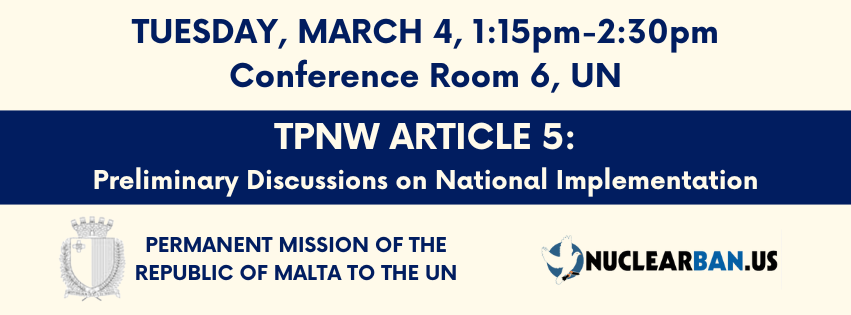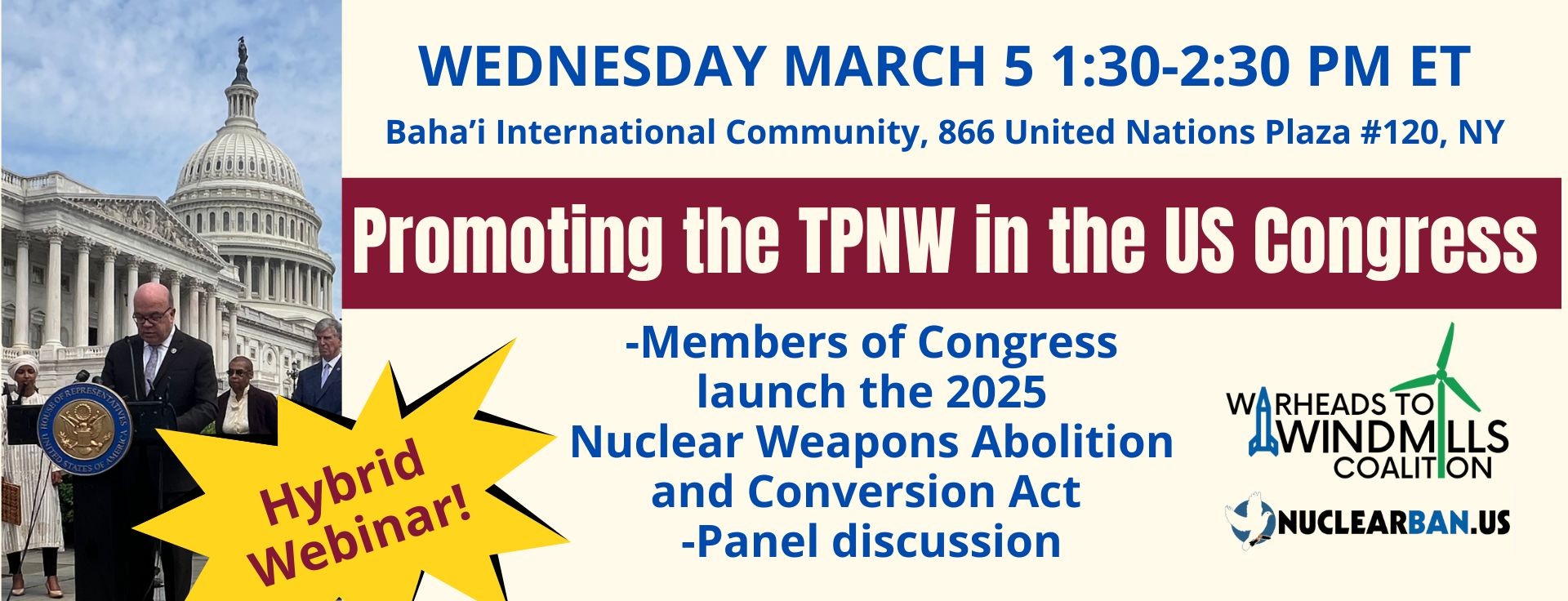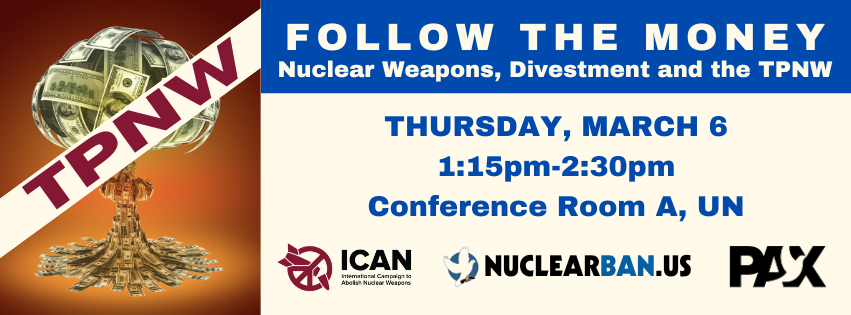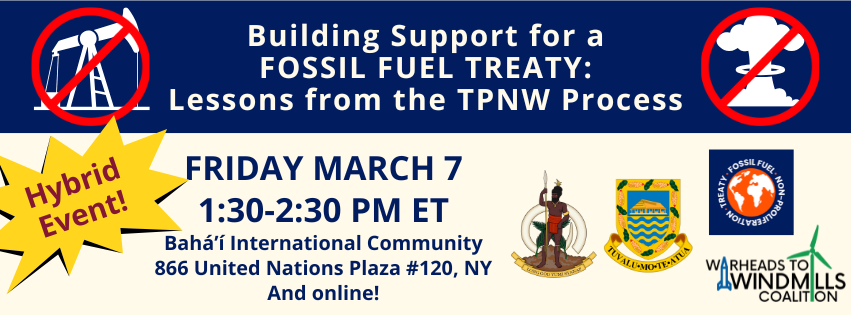Sunday, March 2nd
A Warheads to Windmills Dinner Gathering
5pm at La Salle Dumpling Room,
3141 Broadway, NYC
Open to Warheads to Windmills members and friends, please email timmon@nuclearban.us if you plan on attending so we can make sure we have enough room.
Tuesday, March 4th

Article 5: Preliminary Discussions on National Implementation
1:15pm-2:30pm in Conference Room 6, UN Headquarters, NY
Hosted by the Permanent Mission of Malta
Registration Required by Monday, March 3rd. UN badge required
This event will discuss the progress of states parties to fulfill obligations under Article 5 of the treaty, enacting national legislation to enact the Treaty domestically. (click to open more details)
After signing and ratifying, or acceding to the Treaty on the Prohibition of Nuclear Weapons (TPNW), ensuring that its prohibitions are fully adhered to in each of the States Parties to the treaty is critical to the eventual complete elimination of nuclear weapons and the danger they pose to all of humanity.
Article 5 of the TPNW obligates States Parties “to take all appropriate legal, administrative, and other measures, including the imposition of penal sanctions, to prevent and suppress any activity prohibited to a State Party under this Treaty undertaken by persons or on territory under its jurisdiction or control.”
The ICRC has drafted model legislation for common law states who wish to adopt the appropriate legislation. According to the Nuclear Ban Monitor, two States Parties have so far enacted legislation specifically to meet their Article 5 obligations. However, some States Parties have pre-existing legislation that already meets all of the requirements of Article 5. And almost all States Parties have some form of legislation that penalizing at least some of the activities prohibited by the TPNW.
So far, assisting State Parties to fulfil the obligations of Article 5 has not received the same level of attention being given to many of the other Articles in the TPNW. Civil Society representatives at both the first Meeting of State Parties (1MSP) and the second Meeting of State Parties (2MSP) to the Treaty on TPNW have proposed more discussion about this. And in July, 2024, following informal discussions with a number of States Parties in New York, the NGO NuclearBan.US undertook a mapping exercise to identify what relevant legislation may already exist in States Parties, based on their reporting to the UNSC1540 matrix.
This side event taking place in the margins of the third Meeting of State Parties to the Treaty will now provide an opportunity for States Parties to hear about the initial mapping exercise undertaken and the findings from it. States Parties will have the opportunity to discuss the next steps and ways forward to further advance Article 5 in the lead up to the TPNW Review Conference in 2026.
Wednesday, March 5th

Strategies for Promoting the TPNW in the US Congress
1:30pm-2:30pm, Baháʼí International Community, 866 United Nations Plaza #120, New York
This event will be a hybrid webinar, in person for civil society at the 3MSP, and on zoom for activists who aren’t able to be in New York!
Open to all activists and advocates for nuclear abolition.
In Person Registration:
required by noon, Monday March 3rd
Online Registration:
Register to receive the zoom link!
The Nuclear Weapons Abolition and Conversion Act will be reintroduced in congress to call on the United States to sign the TPNW. Members of Congress will give a press briefing on the bill from Washington DC. TPNW activists in New York will watch the launch and strategize. (click to open more details)
Program:
Video launch of the Nuclear Weapons Abolition and Conversion Act with remarks from:
Congressman Jim McGovern (MA)
Congresswoman Eleanor Holmes Norton (DC)
And more TBA!
A hybrid panel discussion by TPNW and congressional activists including:
Ellen Thomas of the Proposition 1 Campaign, WILPF US, Warheads to Windmills Coalition
David Gibson of Peace, Justice, Sustainability Now, Warheads to Windmills Coalition
Timmon Wallis of NuclearBan.US, Warheads to Windmills Coalition
Vicki Elson of Treaty Alignment Campaign, Warheads to Windmills Coalition
and more TBA!
Thursday, March 6th

Follow the money: Nuclear Weapons, Divestment and the TPNW
1:15pm-2:30pm in Conference Room A, UN Headquarters, NY
NGO side event hosted by ICAN, PAX, and NuclearBan.US
Open to all, UN badge required
This event will take stock and address current challenges and opportunities in promoting the Treaty’s objectives through the channel of divestment. (click to open more details)
The adoption and entry into force of the UN Treaty on the Prohibition of Nuclear Weapons (TPNW) has generated growing momentum for nuclear weapons divestment. Financial institutions citing the TPNW as a decisive factor to exclude nuclear weapons from investment have clearly shown the Treaty’s impact, in some cases even extending beyond the borders of states parties. Investors are also increasingly taking a leadership role in supporting nuclear disarmament.
Private corporations that develop, assemble and maintain nuclear weapons wield enormous power over government policies, especially in the United States, through their direct lobbying efforts, financing of election campaigns, revolving door appointments, pro-nuclear think-tanks, and influence over the mass media. Divestment campaigns and other forms of stigmatization are therefore key to achieving the Treaty’s objectives in the medium to long-term.
Four years after the TPNW’s entry into force, this event will take stock and address current challenges and opportunities in promoting the Treaty’s objectives through the channel of divestment.
Grethe Østern, editor, Nuclear Ban Monitor, How the Treaty relates to divestment
Timmon Wallis, NuclearBan.US, Why divestment is so important
Alejandra Munoz of PAX, What we know about the companies and the investors
David Schilling Interfaith Center for Corporate Responsibility (ICCR), Why shareholder action is a path to consider
Marco Carlizzi, chairman, Etica SGR, How the financial community is already taking action
Friday, March 7th

Building Support for a Fossil Fuel Treaty Lessons from the TPNW Process
1:30pm-2:30pm, Bahai International Community, 866 United Nations Plaza #120, New York
Side event hosted by the Permanent Missions of Tuvalu and Vanuatu with support from the Warheads to Windmills Coalition, and the Fossil Fuel Treaty Initiative
In Person Registration:
required by noon, Wednesday, March 5th
Online Registration:
Register to receive the livestream link!
This briefing will explore the urgent need for a Fossil Fuel Non-Proliferation Treaty, a proposal currently spearheaded by 16 nation-states and the valuable lessons that can be drawn from the TPNW process. (click to open more details)
As governments gather for the Third Meeting of States Parties to the Treaty on the Prohibition of Nuclear Weapons (3MSP), this special briefing will explore the urgent need for a Fossil Fuel Non-Proliferation Treaty, a proposal currently spearheaded by 16 nation-states and the valuable lessons that can be drawn from the TPNW process.
Hosted in NYC for UN Missions and live-streamed for policymakers globally, the event will provide insights into how countries successfully negotiated the TPNW—transforming a bold vision to ban nuclear weapons into a legally binding agreement—and how similar strategies could support efforts to manage a global just transition away from fossil fuels in line with climate science and justice.
Join us for a discussion on the path to negotiation of an international treaty to manage and finance a global just transition away from fossil fuel production to a clean energy future.
